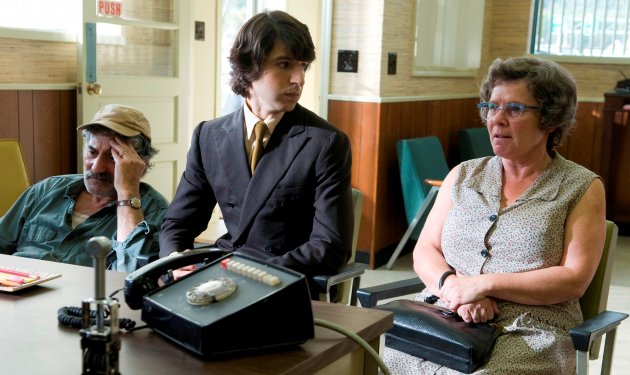Henry Goodman, Demetri Martin & Imelda Staunton: the family Teichberg
Taking Woodstock is a sweet, little film, surprisingly unambitious coming from Ang Lee – one of the few directors who could get this many extras & such gigantic sets for what really is a coming-of-age / coming-out story. The film follows Elliot Teichberg, a budding New York City painter who’s returned home to White Lake, NY, where his parents run a decrepit motel, after the Stonewall Riots. The narrative is that Elliott, nominally the head of White Lake’s Chamber of Commerce, reaches out to the Woodstock promoters after they’re turned down for a permit to play in another upstate hamlet, introduces them to Max Yasgur, another Brooklyn Jew gone rural, & before you know it a half-million hippies are tripping in the mud.
It hardly matters that nobody else remembers it the way Teichberg (now Tiber) tells it in a co-written memoir Lee uses as the basis for the film. What nobody disputes is that the motel functioned as the headquarters for the crew as they put the festival together. Which meant massive reconstruction to bring the place up to code while people were staying there – sometimes with rooms divided by hanging sheets – helicopters were landing in the front yard & hundreds of thousands of vehicles and foot travelers passed by on the street.
All of which is essentially a backdrop for the family story that is the heart of the film, a tale of the kid who may be gay in the city, but is closeted at home – at least until he hires the butchest drag queen ever for security during the event. Played by Liev Schreiber, Vilma is one of two characters who function principally to enable narrative & meaning, the other being Tisha, played by Mammie Gummer, the female friend of Michael Lang, the music promoter who is handling all of the details of the event on Max’s farm. Tisha & Vilma periodically step forward to tell Elliot what Ang Lee wants us to be thinking. The other principal characters in the plot don’t add much. The best are Billy, the Vietnam vet with a bad case of PTSD (played with great intensity by Emile Hirsch) and VW guy & gal (Paul Dano, the “baby-faced preacher” of There Will Be Blood) & Kelli Garner (whose prior career consists of not much) who give Elliott some acid principally so Lee can evoke a sense of the grooviness of it all via CGI of patterns of hippie batik and, a smidgen later & to better effect, the entire field of Yasgur’s farm undulating in the music.
Oh, and the music. There’s relatively little of it, virtually all in the background & much of it deliberately inaudible – probably the most realistic effect of all. What this movie is not about is the concert. Narratively, the concert is irrelevant, or at least relevant only as an excuse to set things into motion at the motel.
At the movie’s start, the hotel is in greater danger of foreclosure than the sheets are of getting washed. Woodstock Enterprises take care of that, and the mortgage is paid off. But Elliott’s parents, Jewish immigrants who’ve moved up from Brooklyn to take advantage of the Catskill traffic, hardly live in the United States. His mother, in particular, played brilliantly by Imelda Staunton (the lead role in Vera Drake, for which she was nominated for an Oscar, Dolores Umbridge to Harry Potter fans), is a Russian Jew who still is haunted by every harmful thing since the pogroms (and the neighbors, upset at all the hippies descending on the town, paint swastikas on some of the motel buildings, just to keep the paranoia real). This is a woman entirely governed by fear & loss & grief & anger – and Staunton gets her exactly right. If there is a single reason to see Taking Woodstock, it’s to watch Staunton, who lights up every scene & is unpredictable in all the right ways. This is a film in which there are two types of scenes. Those with her in it, and those without. Those without are never nearly as good. Henry Goodman, another British actor, plays her husband by channeling Peter Falk, rather the way Martin plays Elliott as a younger version of Zach Braff. They’re nice, inoffensive characters but that’s hardly what you go to the movies to see. All of which makes Taking Woodstock a curious trip indeed.






